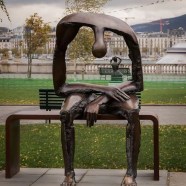 December
22
December
22
Tags
Melancholy

This sculpture is by Swiss artist, Albert György, is installed at the side of Lake Geneva. The figure sends a familiar message. Head down, filled with emptiness. It portrays how we may be gutted by the hardships of life.
When this sculpture was installed in 2018, it was shared over 200,000 times on Facebook and seen by over 25 million people in the week following its installation. The artwork struck a chord, showing how powerful a single artwork can be, touching so many people.
We can all relate to this sentiment, even—or maybe especially—at Christmastime. A few years ago, on Christmas day, I visited the hospital across the street. My friend’s son, 22 years old, was in the fight for his life against leukemia. At that point, it was still very much touch and go; his survival was hanging in the balance. As you can expect, his whole family was gathered together in the hospital room. I was only allowed in as far as the door and didn’t stay long. I just dropped off a plate of chocolate-covered strawberries, greeted them, and went on my way. As I was leaving, I waved and said, “Merry Christmas.” The look on the faces of the family in the room made me realize immediately that “Merry Christmas” was the last thing they wanted to hear.
As my friend walked me to the elevator, I apologized. She explained how hard it had been for her family to have everyone wish them a Merry Christmas. It was a brutal reminder of the painful, terrifying, not-at-all-merry interruption in their lives.
When I got home, I pondered, and I cried. How could I be so insensitive? How could I add to their pain like that? I should know better. But the more I thought about it, the more I realized that I would not change my words, but perhaps could explain them. This is what I wrote on their son’s Caring Bridge site: “As I left your room today, I said, ‘Merry Christmas.’ I realize that your Christmas is anything but merry. Forgive me. But I want you to know that my words are not a flippant wish for merriment, but a reminder of the reality of God’s love in the midst of our suffering and humanity.”
Being Human connection: This young man’s cancer, along with a myriad of other tragedies in our corporate and personal narratives, leaves us reeling and asking “why?” and “how could?” Christmas is a reminder that the answer can’t be found in theology or doctrine or creeds. The answer to our difficult questions is not solved with words, but with presence; not with words but with the Word—the God who became one of us and was present among us. The message that God loves us enough to enter into our sorrows and sufferings is one that never rings hollow. What we could not do for ourselves, Christ has done for us through his humble birth, perfect life, painful death, and glorious resurrection. So I say with much gusto to you—“Merry Christmas!”
“The Word became flesh and made his dwelling among us. We have seen his glory, the glory of the One and Only, who came from the Father, full of grace and truth.” -John 1:14
P.S. My friend’s son is OK, cancer-free! But the toll of the chemotherapy still leaves many unknowns. As you can imagine, Christmas for them has taken on new meaning.
Featured art: Albert György, Melancholy, 2018, Lake Geneva, Switzerland
